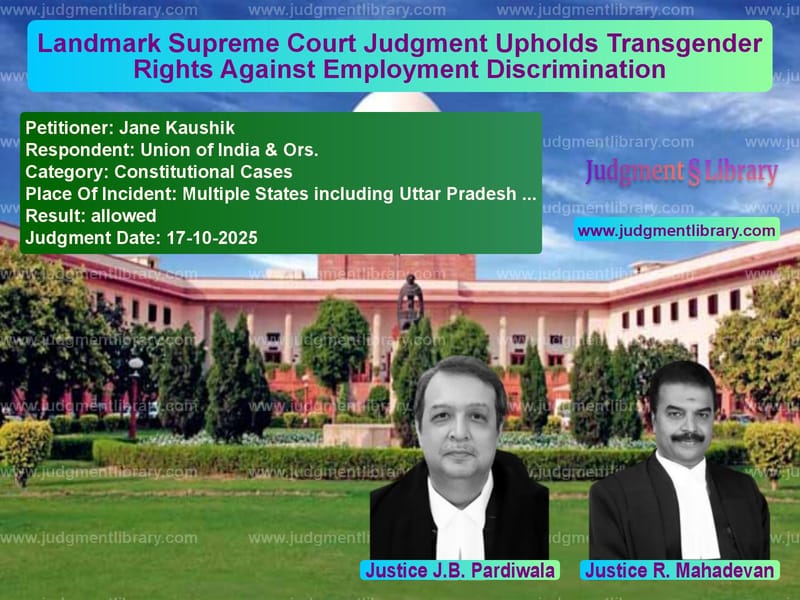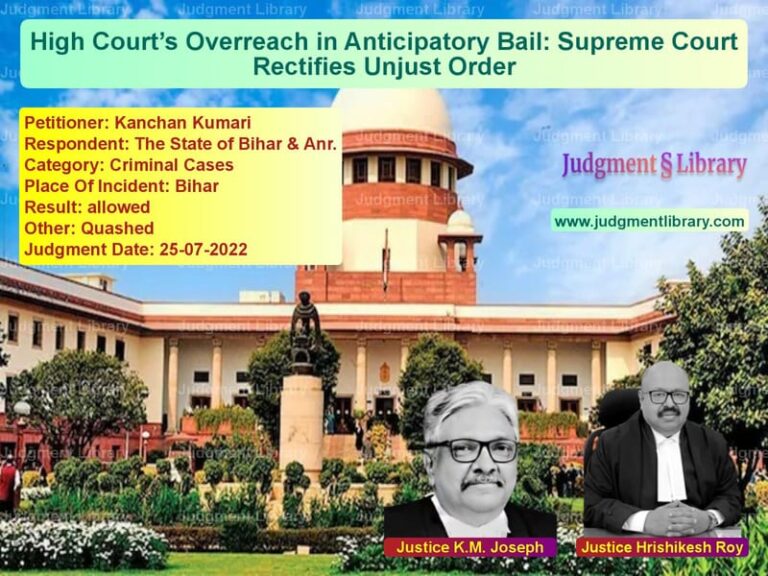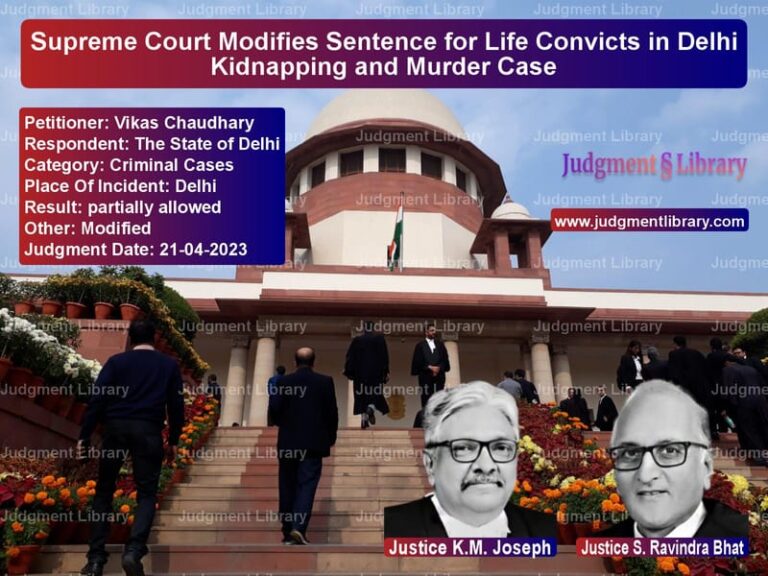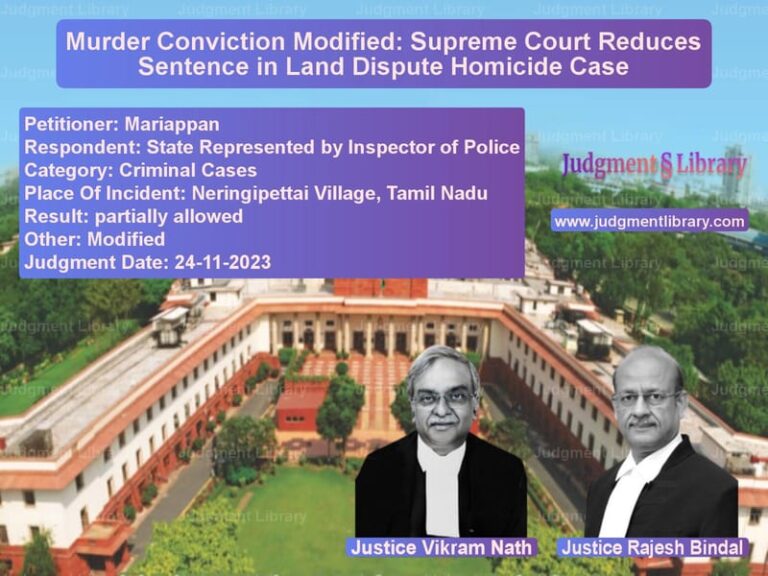Landmark Supreme Court Judgment Upholds Transgender Rights Against Employment Discrimination
In a powerful and transformative judgment delivered on October 17, 2025, the Supreme Court of India addressed the systemic discrimination faced by transgender individuals in employment and education. The case of Jane Kaushik v. Union of India & Ors. emerged from the distressing experiences of a transgender woman who faced termination from two private schools within a year, allegedly due to her gender identity. The judgment, authored by Justices J.B. Pardiwala and R. Mahadevan, not only provided relief to the petitioner but also laid down a comprehensive framework for the protection of transgender rights under the Transgender Persons (Protection of Rights) Act, 2019.
The petitioner, Jane Kaushik, a qualified teacher with a postgraduate degree in Political Science and a Bachelor of Education, was appointed as a Trained Graduate Teacher in English and Social Science at the First School in November 2022. Within eight days of her joining, she was subjected to name-calling, harassment, and body-shaming by colleagues and students. Despite informing the Principal, who assured action, she was forced to resign on December 3, 2022, after revealing her identity to a student. The school later claimed her termination was due to poor performance, but also acknowledged her good command over English and offered to rehire her for a future vacancy. However, when she reapplied, the school did not consider her candidature.
Subsequently, Jane received an offer letter from the Second School in July 2023 for the position of an English Teacher. However, upon learning of her transgender identity during document verification, the school denied her employment and even refused her entry into the premises. Jane approached various fora, including the National Commission for Women (NCW) and the National Council for Transgender Persons (NCTP), but received no redressal. The NCW’s Inquiry Committee concluded that no discrimination was made out, focusing instead on her teaching performance.
Arguments of the Petitioner
The petitioner, represented by Senior Counsel Mr. Yashraj Singh Deora, argued that the lack of adequate compliance, enforcement, and implementation of the 2019 Act and the 2020 Rules by the State Respondents led to the discrimination she faced. He submitted that the First and Second Schools flagrantly violated the provisions of the 2019 Act by not providing a grievance redressal mechanism as per Section 11 of the Act and Rule 13 of the 2020 Rules. He emphasized that the Respondent States failed to notify rules under Section 22(1) of the 2019 Act, rendering statutory protections ineffective.
Mr. Deora invoked fundamental rights under Articles 14, 15, 17, 19, and 21 of the Constitution, alongside statutory recognitions under the 2019 Act. He relied on the “but for” test from the U.S. Supreme Court’s decision in Bostock v. Clayton County, arguing that but for her gender identity, Jane would not have been terminated. He also cited Lt. Col. Nitisha v. Union of India to highlight the difference between formal and substantive equality, asserting that Jane was subjected to both direct and indirect discrimination, depriving her of livelihood and amounting to “economic death.”
Arguments of the Respondents
The First School, represented by Mr. Mohit Negi, contended that Jane’s termination was due to her inability to meet teaching standards, misbehavior, and temperamental issues. They argued that the relationship was contractual, and a writ petition under Article 32 was not maintainable for enforcing private contracts. They relied on St. Mary’s Education Society v. Rajendra Prasad Bhargava to assert that interference in the affairs of private unaided schools was unwarranted.
The Second School, represented by Mr. Atul Kumar, argued that the offer letter did not culminate into a contract of service, and the petitioner could not seek relief under Article 32 for enforcing an “offer letter.” They submitted that Sections 3(b) and 9 of the 2019 Act cast a negative duty on employers, not a positive duty to appoint transgender persons. They relied on Satimbla Sharma v. St. Pauls Senior Secondary School to argue that issues relating to salaries in private schools do not fall under public law.
Court’s Analysis and Key Arguments
The Supreme Court expressed deep concern over the plight of the transgender community, noting that despite the 2019 Act and the landmark NALSA v. Union of India judgment, transgender persons continue to face discrimination, marginalization, and exclusion. The Court emphasized that the right against discrimination is integral to the Constitution, and the State’s inaction in implementing the 2019 Act amounted to “omissive discrimination.”
The Court underscored the importance of substantive equality, drawing on Sandra Fredman’s four-dimensional framework: redressing disadvantage, addressing stigma and stereotypes, enhancing voice and participation, and accommodating difference to achieve structural change. The Court held that “equality would demand embracing notions of positive obligations and reasonable accommodation.”
Read also: https://judgmentlibrary.com/supreme-court-issues-directions-in-public-interest-litigation-case/
The Court also highlighted the horizontal application of fundamental rights, noting that the 2019 Act imposes duties on both State and private establishments to prevent discrimination. The Court observed that “the promise of equal protection of law would also ensure the promise of reasonable accommodation.”
In addressing the discrimination faced by Jane, the Court found that the First School had attempted to accommodate her but failed to comply with the statutory requirement of appointing a complaint officer. However, the Court held that the Second School’s denial of employment after issuing an offer letter was clearly based on her gender identity, violating Section 9 of the 2019 Act.
The Court awarded compensation of Rs. 50,000 to Jane, payable by the Second School, and directed the Union of India and the concerned States to pay Rs. 50,000 each for their failure to implement the 2019 Act. The Court also issued directions for the establishment of grievance redressal mechanisms, transgender protection cells, and welfare boards at the State and district levels.
Additionally, the Court constituted an Advisory Committee, chaired by former Delhi High Court Judge Justice Asha Menon, to formulate a comprehensive policy for transgender rights. The Committee includes trans-rights activists, legal experts, and government officials, tasked with addressing gaps in the 2019 Act and promoting inclusivity.
The judgment concluded with a call to action, urging the State and society to undo historical injustices and ensure that transgender persons can live with dignity and equality. The Court’s decision marks a significant step toward realizing the constitutional promise of substantive equality for the transgender community.
Petitioner Name: Jane Kaushik.Respondent Name: Union of India & Ors..Judgment By: Justice J.B. Pardiwala, Justice R. Mahadevan.Place Of Incident: Multiple States including Uttar Pradesh and Gujarat.Judgment Date: 17-10-2025.Result: allowed.
Don’t miss out on the full details! Download the complete judgment in PDF format below and gain valuable insights instantly!
Download Judgment: jane-kaushik-vs-union-of-india-&-ors-supreme-court-of-india-judgment-dated-17-10-2025.pdf
Directly Download Judgment: Directly download this Judgment
See all petitions in Fundamental Rights
See all petitions in Public Interest Litigation
See all petitions in Education Related Cases
See all petitions in Reservation Cases
See all petitions in Other Cases
See all petitions in Judgment by J.B. Pardiwala
See all petitions in Judgment by R. Mahadevan
See all petitions in allowed
See all petitions in supreme court of India judgments October 2025
See all petitions in 2025 judgments
See all posts in Constitutional Cases Category
See all allowed petitions in Constitutional Cases Category
See all Dismissed petitions in Constitutional Cases Category
See all partially allowed petitions in Constitutional Cases Category







